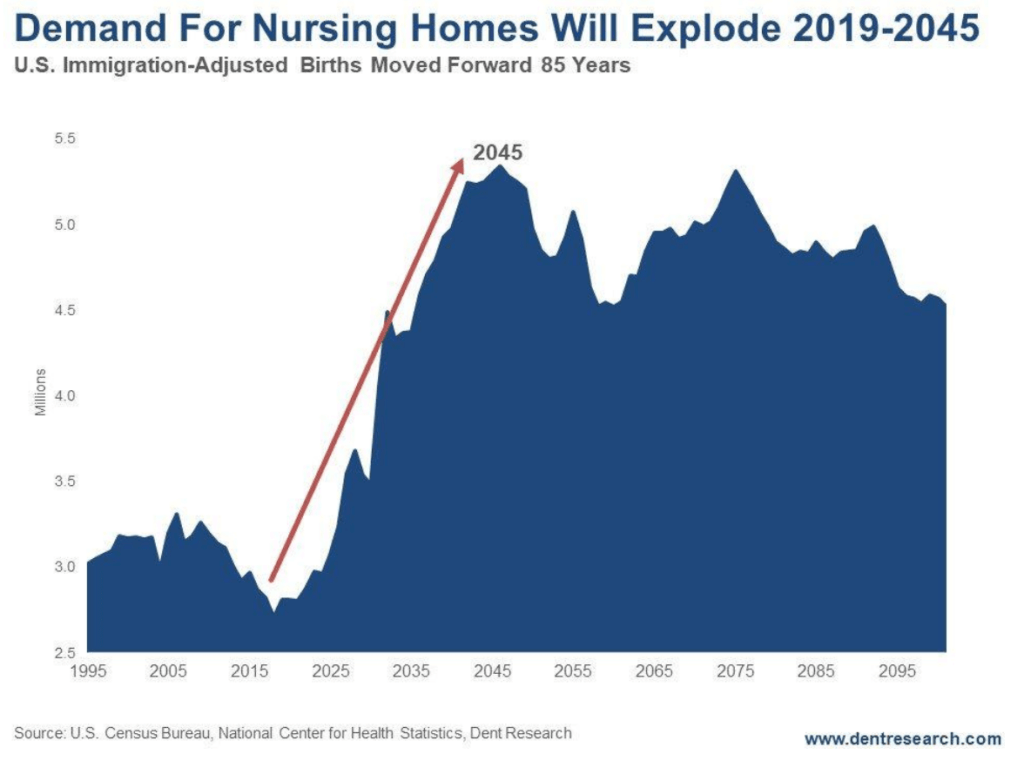Business
Real estate, nursing homes face effects of boomer retirement until 2024
Recently we talked about why millennials aren’t buying a house at the same rate as their boomer and Gen X parents.

Today, let’s talk about how boomers and Gen Xers are actually contributing to the housing shortage, and so driving up prices and thwarting the ability of younger people to buy.
And, why that could start to change rapidly just ahead.
First, an interesting insight
A recent Freddie Mac study estimates that 2.5 million homes are being kept off the market, mostly by seniors aging in place rather than downsizing or moving into nursing homes, etc.
One million of those people were born between 1931 and 1941. 300,000 of them were born between 1942 and 1947. 250,000 of them were born between 1948 and 1958.
That means that the majority of these “aging-in-placers” aren’t boomers (according to how I count that generation).
Turns out, we can’t blame them for this trend!
But there is a massive boomer retirement trend that started in 2000 and will last into 2024.
It will see more homes kept off the market as this great generation chooses to age in place. But it will also see a ton of homes hitting the market when others opt for downsizing and nursing home care.
The question is: which scenario will trump the other?
There are two big problems here
One, boomers are watching in horror as their McMansions are falling in value while the value of the smaller homes they could downsize into are holding up better. That makes trading down less attractive.
Two, nursing homes are increasingly expensive, with subpar service.
However, contrary to popular opinion, boomers haven’t yet started their trek through the peak spending wave for this sector, which peaks at age 84-plus. That’s why there is some excess capacity. They only start this journey this year.
Just look at this:

© Harry Dent
Note that I’ve lagged the birth index 85 years in this chart.
And I reckon that the number of boomers who will choose NOT to age in place will quickly overwhelm the numbers that do.
Overall, I clearly see the nursing home trend flooding the property market with boomer homes for sale. That’s what my “dyers versus buyers” indicator has said would occur in line with this trend into around 2040.
Real estate prices will buckle under the deluge
Japan’s aging population and eight million empty homes, trending towards 15 million, would vouch for this trend.
So, don’t believe this housing shortage will continue, especially with the “Great Reset” in consumer and asset prices just ahead from 2020 into 2023 or so. It will reverse and likely rapidly!
Lower prices and boomers moving rapidly into nursing homes will make home buying more affordable again and raise ownership for millennials.
But, this younger generation seems to buy less and rent more regardless of affordability. They’re more interested in spending money on “experiences.” So, millennial home buying won’t save the property market.
Mark my words: real estate will never be what it was before the 2006-2012 crash.
Most important: Look for the great opportunity in nursing homes ahead.
The companies that can deliver lower costs and more responsive service via room sensors and other technology will make billionaires in this industry in the next 25 years!
(Featured image by MIND AND I via Shutterstock)
—
DISCLAIMER: This article expresses my own ideas and opinions. Any information I have shared are from sources that I believe to be reliable and accurate. I did not receive any financial compensation for writing this post, nor do I own any shares in any company I’ve mentioned. I encourage any reader to do their own diligent research first before making any investment decisions.

-

 Business6 days ago
Business6 days agoDow Jones Breaks 50,000 as Bull Market Surges Amid Caution and Volatility
-

 Business2 weeks ago
Business2 weeks agoBattered, but Still Bullish on Gold & Silver
-

 Impact Investing4 days ago
Impact Investing4 days agoEU Backs 90% Emissions Cut by 2040 and Delays ETS2 Rollout
-

 Crowdfunding2 weeks ago
Crowdfunding2 weeks agoNewcleo Raises $85 Million to Advance Fourth-Generation Nuclear Reactors

























